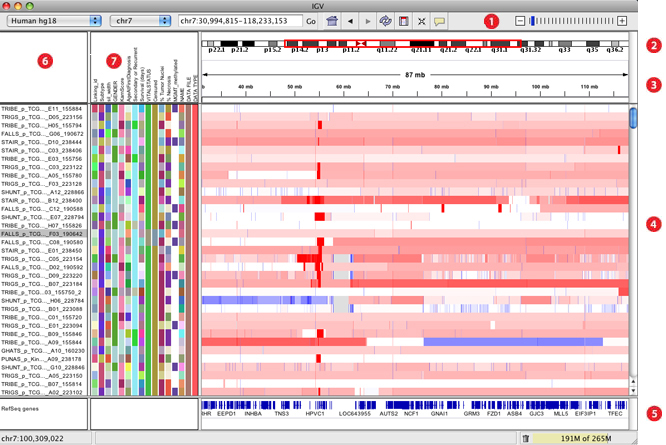The Integrative Genomics Viewer (IGV) is a high-performance visualization tool for interactive exploration of large, integrated genomic datasets. It supports a wide variety of data types, including array-based and next-generation sequence data, and genomic annotations.
Navigation through a dataset is similar to Google Maps, allowing the user to zoom and pan seamlessly across the genome at any level of detail from whole-genome to base pair.
IGV’s scalable architecture makes it well suited for genome-wide exploration of next-generation sequencing (NGS) datasets, including both basic aligned read data as well as derived results, such as read coverage.
Features include:
- Flexible integration of a wide range of genomic data types including aligned sequence reads, mutations, copy number, RNAi screens, gene expression, methylation, and genomic annotation.
- Use of efficient, multi-resolution file formats to enable real-time exploration of arbitrarily large datasets over all resolution scales, while consuming minimal resources on the client computer.
- Supports concurrent visualization of diverse data types across hundreds, and up to thousands of samples, and correlation of these integrated datasets with clinical and phenotypic variables
- Datasets can be loaded from local or remote sources, including cloud-based resources, enabling investigators to view their own genomic datasets alongside publicly available data from, for example, The Cancer Genome Atlas (TCGA, 1000 Genomes (www.1000genomes.org/), and ENCODE (www.genome.gov/10005107) projects. In addition, IGV allows collaborators to load and share data locally or remotely over the Web.
- Cross-platform support – runs under Linux, Mac OS X, Windows, and any other operating system that supports Java 8 or 11.
Website: igv.org/doc/desktop
Support: User Guide, GitHub Code Repository
Developer: Broad Institute and Regents of the University of California
License: MIT License

IGV is written in Java. Learn Java with our recommended free books and free tutorials.
Return to Bioinformatics Tools | Return to Desktop Genome Browsers
| Popular series | |
|---|---|
| The largest compilation of the best free and open source software in the universe. Each article is supplied with a legendary ratings chart helping you to make informed decisions. | |
| Hundreds of in-depth reviews offering our unbiased and expert opinion on software. We offer helpful and impartial information. | |
| The Big List of Active Linux Distros is a large compilation of actively developed Linux distributions. | |
| Replace proprietary software with open source alternatives: Google, Microsoft, Apple, Adobe, IBM, Autodesk, Oracle, Atlassian, Corel, Cisco, Intuit, and SAS. | |
| Awesome Free Linux Games Tools showcases a series of tools that making gaming on Linux a more pleasurable experience. This is a new series. | |
| Machine Learning explores practical applications of machine learning and deep learning from a Linux perspective. We've written reviews of more than 40 self-hosted apps. All are free and open source. | |
| New to Linux? Read our Linux for Starters series. We start right at the basics and teach you everything you need to know to get started with Linux. | |
| Alternatives to popular CLI tools showcases essential tools that are modern replacements for core Linux utilities. | |
| Essential Linux system tools focuses on small, indispensable utilities, useful for system administrators as well as regular users. | |
| Linux utilities to maximise your productivity. Small, indispensable tools, useful for anyone running a Linux machine. | |
| Surveys popular streaming services from a Linux perspective: Amazon Music Unlimited, Myuzi, Spotify, Deezer, Tidal. | |
| Saving Money with Linux looks at how you can reduce your energy bills running Linux. | |
| Home computers became commonplace in the 1980s. Emulate home computers including the Commodore 64, Amiga, Atari ST, ZX81, Amstrad CPC, and ZX Spectrum. | |
| Now and Then examines how promising open source software fared over the years. It can be a bumpy ride. | |
| Linux at Home looks at a range of home activities where Linux can play its part, making the most of our time at home, keeping active and engaged. | |
| Linux Candy reveals the lighter side of Linux. Have some fun and escape from the daily drudgery. | |
| Getting Started with Docker helps you master Docker, a set of platform as a service products that delivers software in packages called containers. | |
| Best Free Android Apps. We showcase free Android apps that are definitely worth downloading. There's a strict eligibility criteria for inclusion in this series. | |
| These best free books accelerate your learning of every programming language. Learn a new language today! | |
| These free tutorials offer the perfect tonic to our free programming books series. | |
| Linux Around The World showcases usergroups that are relevant to Linux enthusiasts. Great ways to meet up with fellow enthusiasts. | |
| Stars and Stripes is an occasional series looking at the impact of Linux in the USA. | |
